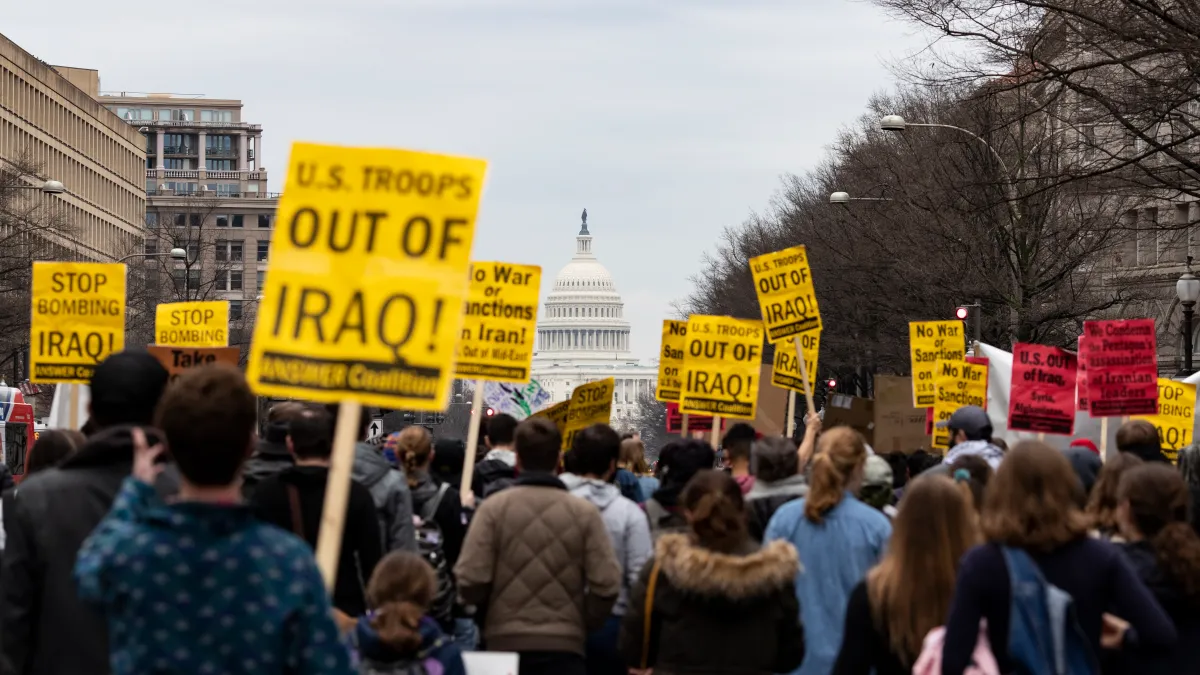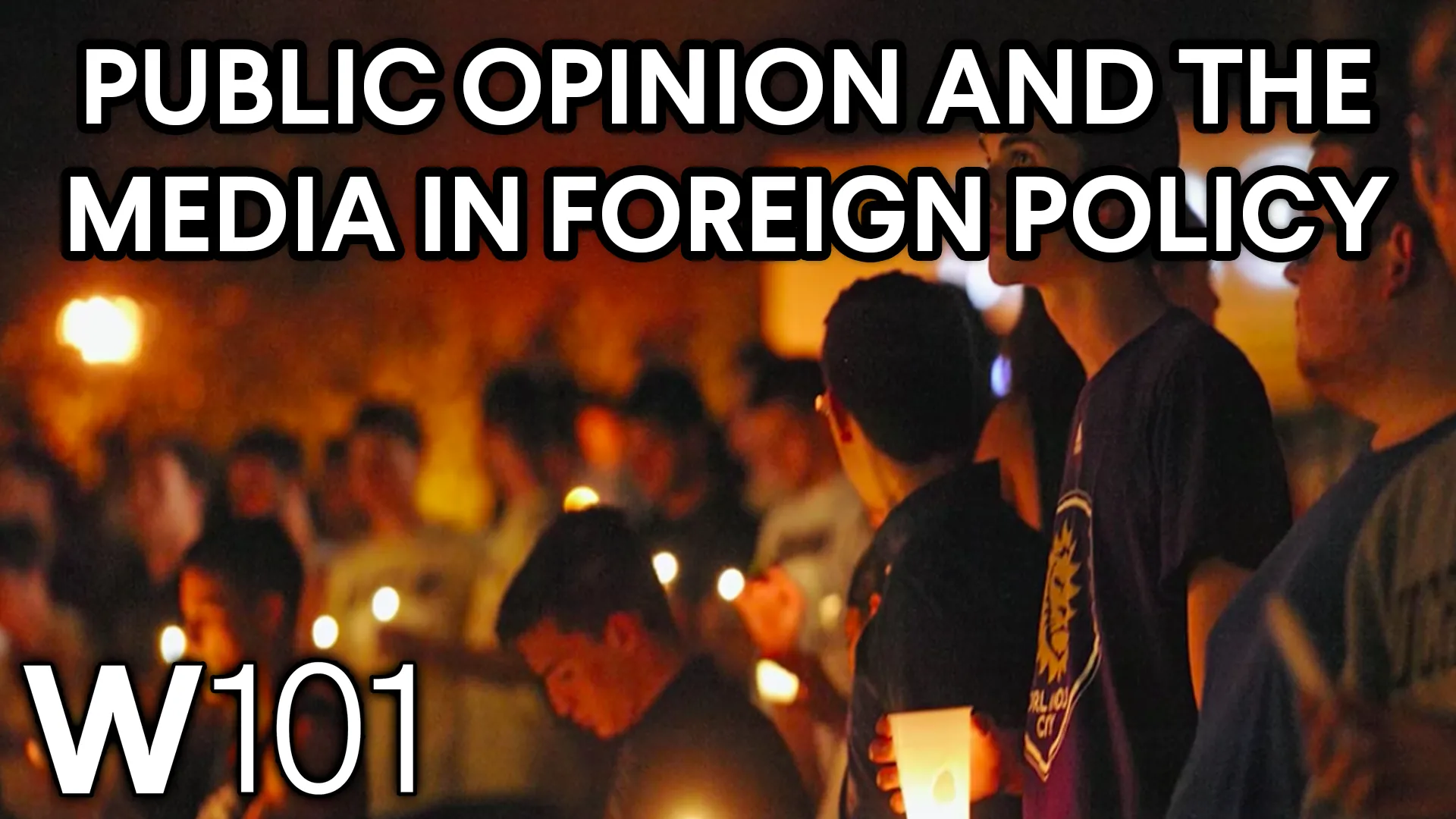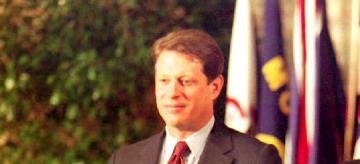How Do Forces Outside Government Influence Policymaking?
Learn how journalism, social media, public opinion, and lobbies are all a part of American democracy and influence U.S. foreign policy.
The president of the United States leads the country’s foreign policy. They are the face of American diplomacy, the leader of the country’s armed forces, and the principal organizer for many of the government’s most ambitious international initiatives.
However, presidents face many checks to their power within the government. Congress, for instance, can refuse to fund a president’s agenda. The legislative branch can also pass laws to curtail an administration’s authority. The judiciary, meanwhile, can constrain the White House if it deems its actions unconstitutional. Even forces within a president’s political party can push and pull the administration’s priorities in different directions.
The U.S. government is an intricate network of counterbalancing forces. However, the government alone does not shape foreign policy. For the United States and democracies like it, several forces outside government inform and influence policymaking. These external forces include the press, public opinion, special interest groups, and think tanks.
In autocratic countries, those forces play a far less significant role. Such governments frequently rig or avoid elections, suppress dissent and co-opt civil society institutions. As a result, an autocratic regime can exercise near-total control over the policymaking process.
In this resource, we’ll explore a democracy’s diverse ecosystem of influential nongovernmental forces. We’ll also take a look at several instances in which nongovernmental institutions have shaped U.S. foreign policy.
Journalism and Social Media
Journalism plays a vital role in healthy democracies. A free and independent press can hold leaders to account by shining a light on abuses of power. It can also provide timely and credible information that helps citizens make informed decisions. The media can also offer diverse perspectives that enrich substantive policy debates.
Newspapers and magazines (print media) as well as radio and television (broadcast media) are traditional forms of journalism. More recently, websites and social media platforms (digital media) have emerged as significant sources of information. They serve as forums for journalists and everyday citizens alike to report on current events and share their opinions.
Investigations by journalists have greatly influenced policy on numerous occasions over the past several decades. They have toppled a presidency after revealing corruption at the highest levels of government. Other investigations have resulted in the upending of data collection after uncovering a secretive mass surveillance program. Journalism has also spurred efforts to reform the international financial system after exposing how the world’s elite hide their vast fortunes and avoid paying taxes.
Social media also has tremendous power to influence policy. This form of digital media allows advocacy groups to raise awareness and drive mass participation. During the 2010–11 Arab Spring protests, activists used Facebook to organize, document, and promote protests. This resulted in the ouster of several autocratic leaders. However, those same platforms that connect democratic protesters have also allowed hate speech and disinformation to spread on a global scale. Following the 2020 U.S. presidential election, false claims of voter fraud spread extensively over social media. This narrative, perpetuated by social media forums, culminated in the violent storming of the U.S. Capitol on January 6, 2021.
Public Opinion and Social Movements
The president’s job is not necessarily to be popular. Instead, the executive is responsible for advancing U.S. security and prosperity. The president is also expected to perpetuate American values both at home and abroad. Popularity, however, can play an important role in the policymaking process. A president who makes unpopular decisions is unlikely to be reelected. As such, public opinion can shape or influence the priority policymakers give to various issues.
Public opinion is expressed in many ways, including through polls and elections. In addition, people can voice their opinions on issues such as climate change and foreign wars by organizing demonstrations, boycotts, and other social movements.
Public opinion can certainly influence and—at times—constrain policymakers. However, it seldom determines U.S. foreign policy outright, in part because many Americans do not follow such issues closely. Navigating public opinion can be tricky for policymakers, especially because consensus can shift dramatically over time. Just because people support a government policy at the outset does not mean they’ll necessarily support the policy later on. For example, 71 percent of Americans supported using military force in Iraq in 2003. By 2006, this figure had dropped below 50 percent. Such public dissatisfaction partially contributed to Republicans losing control of Congress in elections later that year.
Special Interest Groups and Lobbies
Although the broader American public often has limited influence in shaping U.S. foreign policy, smaller, more focused groups of people—also known as special interest groups—can be far more effective.
Special interest groups represent specific needs or goals. These groups can represent the agendas of cities, companies, unions, and civil rights organizations. To advance their particular interests, they often hire lobbyists—paid advocates who seek to influence legislators and other members of government. The United States’ more than ten thousand lobbyists come from fields such as law, policy, and government. Lobbyists are equipped with personal connections and a deep understanding of how government functions.
To prevent bribery, ethics rules prohibit lobbyists from buying votes through money or gifts. However, that line is notoriously blurry. Lobbyists cannot pay legislators directly. However, they can contribute significantly to a politician’s upcoming election campaign. And although lobbyists cannot directly offer gifts, they can still use legal loopholes to organize lavish trips. Lobbyists can treat legislators to ski retreats and luxury wine tours for example.
Lobbyists are often successful at shaping government policy because they are knowledgeable, highly motivated, well connected, and well funded. They can influence policy making by contributing to political campaigns, organizing voters, and informing debates with congressional hearings. Lobbyists can also sponsor legislation—including, in some instances, drafting a bill that legislators will pass into law.
Lobbyists organize around a diverse slate of domestic and foreign policy issues. For example, tech companies have lobbied Congress on issues such as intellectual property rights. Evangelical Christian organizations have lobbied to restrict access to abortion in international family planning aid packages. One of Washington’s most powerful lobbies, the American Israel Public Affairs Committee, has sought to protect the interests of Israel and promote strong U.S.-Israeli ties since 1954.
Think Tanks
Think tanks are institutions that inform and shape policymaking through expert-led research and analysis.
Those organizations come in many shapes and sizes. Some focus on specific issues such as immigration or economic policy. Others cover a wide array of domestic and foreign policy topics. Some are partisan and advocate for a particular strain of policies, such as libertarian or progressive ideas, while others are nonpartisan and hold no institutional positions. Some are fully independent, while others are affiliated with a university, government, political party, or special interest group.
Think tanks provide institutional support for experts and analysts—often journalists, academics, and those who have just left government service or hope to enter it—to conduct research and share their expertise. That often takes the form of publications of all kinds, conferences to discuss policy issues, formal congressional briefings, and informal conversations with policymakers.
As a leading source of expert analysis, think tanks can substantively inform and influence government policy. For instance, in 1947 U.S. diplomat George F. Kennan penned an article in Foreign Affairs—a magazine published by the Council on Foreign Relations—outlining his ideas for U.S. policy toward the Soviet Union. Writing under the pseudonym “X,” Kennan called for a policy of containment. That policy would become the basis of U.S. Cold War strategy for the next four decades.
What influences policymakers?
From social media to think tanks, nongovernmental actors influence American democracy and ensure that policymakers don’t operate in a vacuum. Their decisions are shaped—at times in ways both large and small—by external actors, including everyday citizens.




